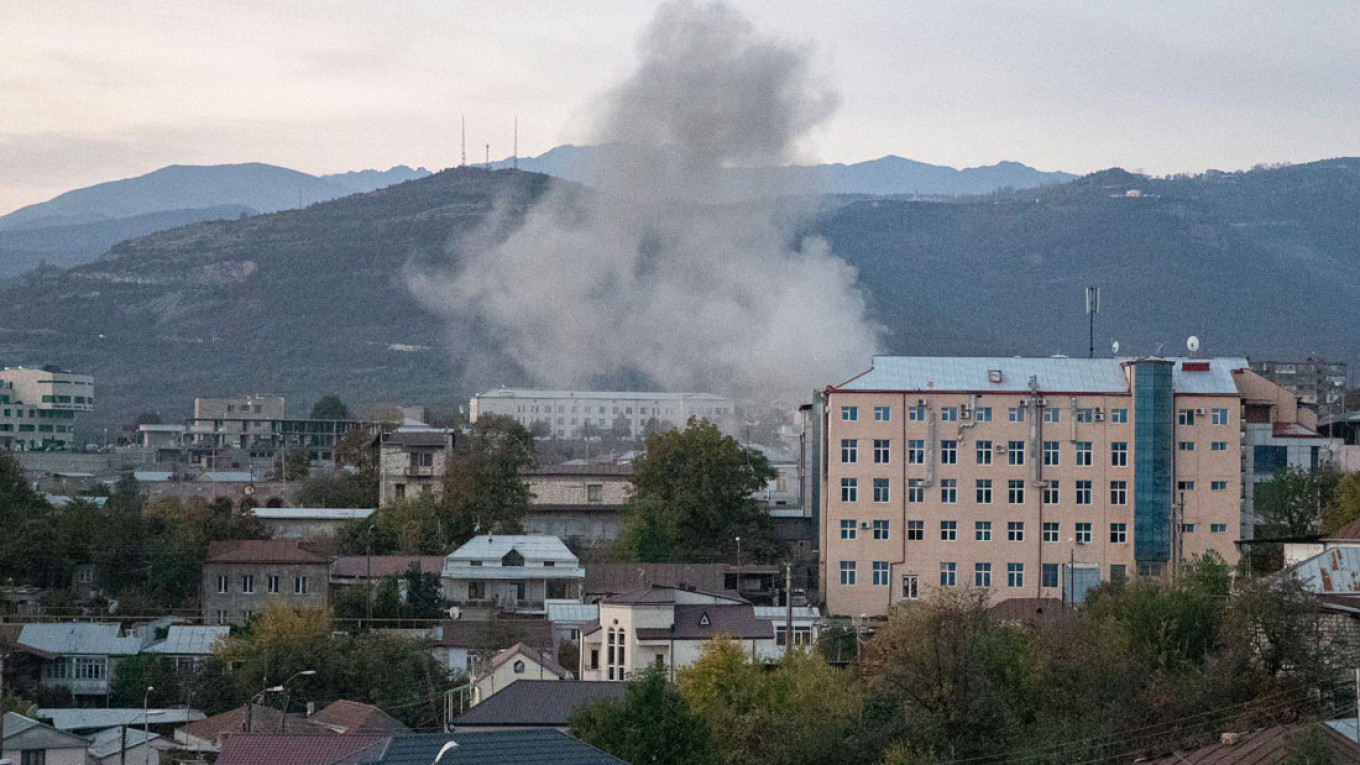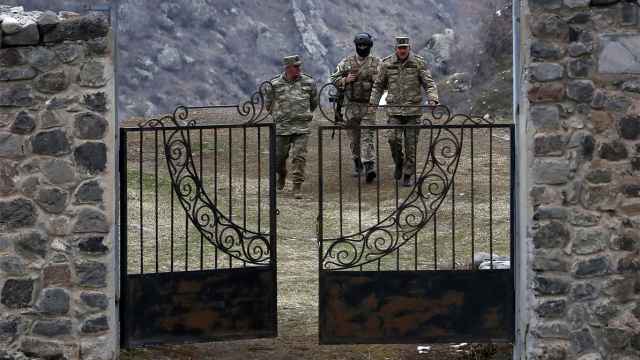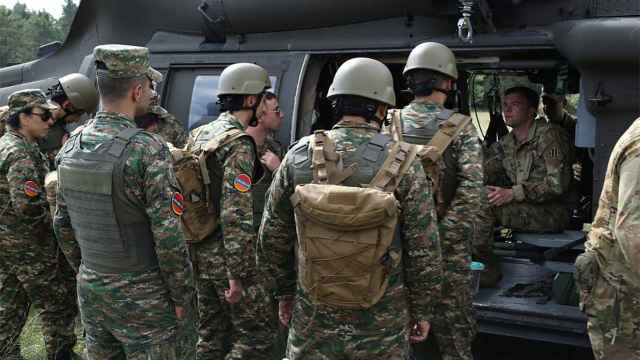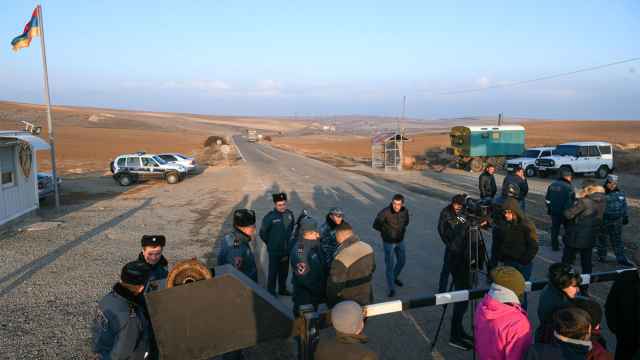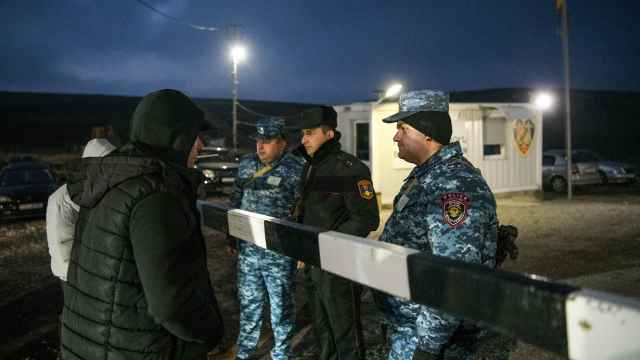Russia said Saturday it would provide "necessary" assistance to Yerevan in its conflict with Azerbaijan if fighting reached Armenian territory after its ally requested help.
Earlier Saturday Armenian Prime Minister Nikol Pashinyan formally asked Russian President Vladimir Putin to begin "urgent" consultations on security assistance in its conflict with Azerbaijan over the breakaway region of Nagorno-Karabakh.
Pashinyan sent the letter to Putin after Armenia and Azerbaijan failed to agree a fresh ceasefire during talks in Geneva on Friday, as fighting continued overnight and Saturday.
The announcements further raised fears of an escalation in fighting between Armenia and Azerbaijan.
Some observers are concerned it risks sucking Yerevan's ally Russia, and Turkey, which backs Baku, into the decades-long conflict.
Armenia and Azerbaijan have been engaged in fierce fighting for more than a month over Nagorno-Karabakh, a region of Azerbaijan controlled by Armenian separatists in the wake of the break-up of the Soviet Union.
The flare-up has left more than a thousand dead, with world powers so far unable to persuade either side to stop fighting.
Russia has a military base in Armenia's second-largest city of Gyumri and has a defense treaty with Yerevan.
Moscow, which has previously said that its defense pact with Armenia does not extend to the breakaway region of Nagorno-Karabakh, reiterated that help would be provided if the fighting expanded.
"Russia will render Yerevan all necessary assistance if clashes take place directly on the territory of Armenia," the foreign ministry said.
At the same, time Russian foreign ministry spokeswoman Maria Zakharova said in televised remarks "concrete formats" of assistance to Armenia would be discussed.
The Russian foreign ministry also called on the warring sides to immediately cease fire, de-escalate tensions and begin "substantive" talks.
Pashinyan in his letter to Putin said that hostilities were getting closer to Armenia's borders and reiterated that Azerbaijan's ally Turkey was backing Baku, the foreign ministry said.
"The prime minister of Armenia has asked the Russian president to begin urgent consultations with the aim of determining the kind and amount of aid which the Russian Federation can provide Armenia to ensure its security," the ministry said in a statement.
Pashinyan requested Moscow's help, invoking the two countries' close ties and a 1997 treaty on friendship, cooperation and mutual assistance.
'Impossible to calculate risks'
Carey Cavanaugh, a former U.S. ambassador and co-chair of the OSCE Minsk group, said Putin was aware that expanded military engagement in the conflict was not in Moscow's interest.
"It is impossible to calculate the risk, but injection of either Russian or Turkish armed forces at this point would mark a significant escalation of the conflict," Cavanaugh, a professor of diplomacy at the University of Kentucky, told AFP.
At the same time, he said, "Russia could move some forces out of barracks in Gyumri to enhance border protection (they already cooperate on that) or to assist with any outflow of displaced civilian population fleeing from the fighting."
Hikmet Hajiyev, an aide to the Azerbaijani president, told AFP that Baku would not comment.
On Friday, mediators from France, Russia and the U.S. said in a statement from Geneva that the warring sides had committed to "not deliberately target civilian populations or non-military objects in accordance with international humanitarian law."
But the defense ministry of the Karabakh separatist leadership on Saturday accused Azerbaijan of violating the Geneva agreements and targeting the main city Stepanakert and the strategically important town of Shusha.
The ministry said there were "wounded among civilians" in Shusha. Baku denied targeting the main city in Karabakh.
Azerbaijan and Armenia have been locked in a bitter conflict over Karabakh since Armenian separatists backed by Yerevan seized control of the mountainous province in a 1990s war that left 30,000 people dead.
The current clashes broke out on Sept. 27 and fighting has persisted despite repeated international attempts to secure a ceasefire.
The warring sides have three times agreed to ceasefires during recent talks mediated by Russia, France and the United States but the truces have all quickly fallen apart.
More than 1,200 people from both sides have been reported dead since the fighting began but the actual death toll is believed to be substantially higher.
A Message from The Moscow Times:
Dear readers,
We are facing unprecedented challenges. Russia's Prosecutor General's Office has designated The Moscow Times as an "undesirable" organization, criminalizing our work and putting our staff at risk of prosecution. This follows our earlier unjust labeling as a "foreign agent."
These actions are direct attempts to silence independent journalism in Russia. The authorities claim our work "discredits the decisions of the Russian leadership." We see things differently: we strive to provide accurate, unbiased reporting on Russia.
We, the journalists of The Moscow Times, refuse to be silenced. But to continue our work, we need your help.
Your support, no matter how small, makes a world of difference. If you can, please support us monthly starting from just $2. It's quick to set up, and every contribution makes a significant impact.
By supporting The Moscow Times, you're defending open, independent journalism in the face of repression. Thank you for standing with us.
Remind me later.


